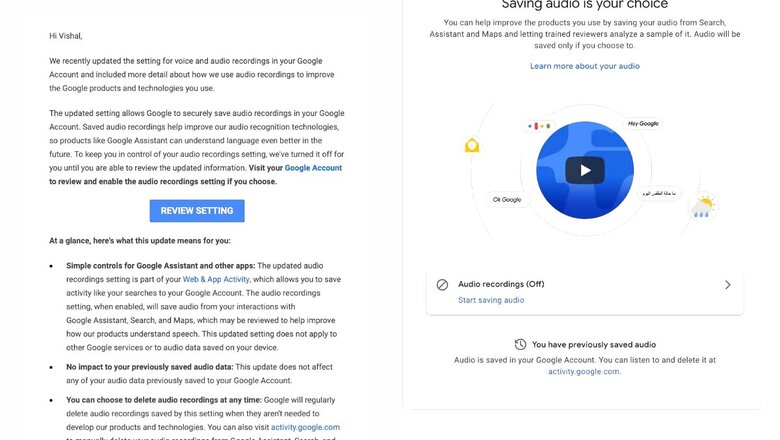
views
If you haven’t already, you might soon be getting an email from Google with a spot of good news. That is, if you are bothered about the privacy of your data. Google is sharing its new updated privacy policy regarding the collection of audio samples whenever you speak with Google Assistant, the virtual assistant on Android phones, Android TVs and Google’s Nest line-up of smart speakers and smart displays. The company now says that they are now automatically opting-out all users from having their audio recording samples saved in their Google account. If you have a Google Home smart speaker, for instance, you really should pay close attention to this.
“The updated setting allows Google to securely save audio recordings in your Google Account. Saved audio recordings help improve our audio recognition technologies, so products like Google Assistant can understand language even better in the future. To keep you in control of your audio recordings setting, we've turned it off for you until you are able to review the updated information,” says the new Google policy on voice and audio settings for your Google account. If you want, you can go ahead and enable this activity.google.com or even delete all the previous recordings that might be saved in your account. In fact, it may be important to delete any existing audio recordings in your account because interestingly enough, this policy update doesn't talk about how Google is going to deal with audio clips and recordings already uploaded and saved in your account.
This update is extremely important because the audio samples taken from our conversations with Google Assistant are used to develop and improve audio recognition tech that is working in the background. For this, the audio samples are analyzed by humans, which Google refers to as trained reviewers. This basically means humans can hear your conversations, be it your direct conversations with Google Assistant on your phone or smart speaker, or even accidental activations when Assistant may think you have called out to it when you haven’t—and you continue having a conversation with another person or over the phone oblivious to this. Google says, “Audio is saved when your device detects an activation, like saying "Hey Google" or touching the mic icon. Some devices include a few seconds before the activation to catch the complete request.”
This update is now rolling out for all Google users, and even if you haven’t received this communication from Google, you can go ahead and turn off the audio recordings settings anyway—or double check if Google has helpfully already done this for you.
These disclaimers and transparency isn't surprising, considering how pretty much every big tech company spent the last year apologising and tweaking the virtual assistant voice sample collection policies, and how they were reviewed by humans at some stage. Google, Amazon, Apple, Microsoft, and Facebook, all faced flak when the lack of clarity and disclaimers about audio recordings came tumbling out into the public domain.




















Comments
0 comment